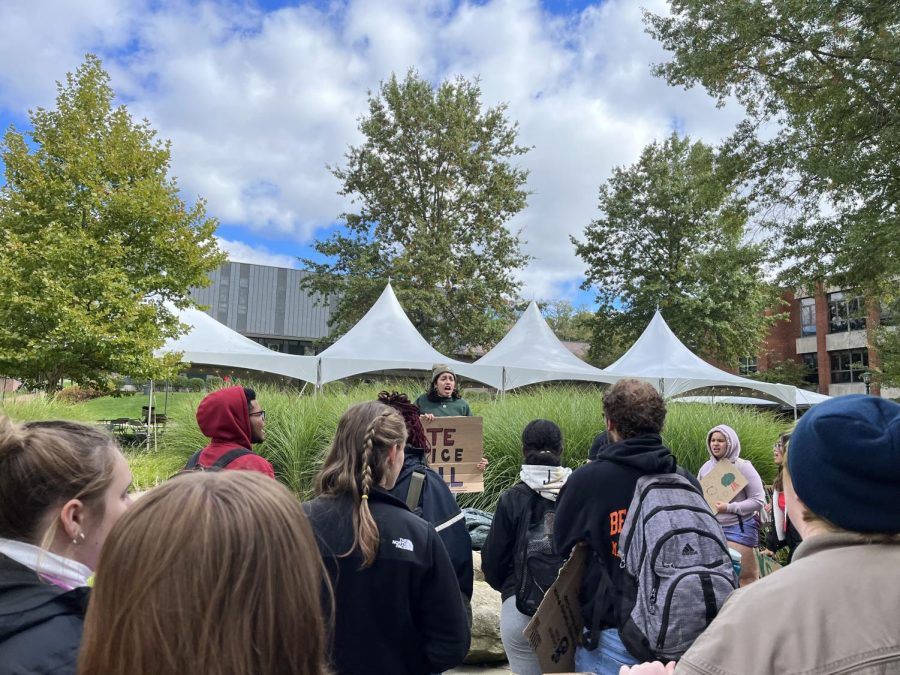The march for climate action
Green Students of Color Society President Bianca Sanchez, ’24, speaks to protesters on the Gator Quad.
A crowd of students demanded climate action legislation from the government by marching across campus on Friday, Sept. 23. The event was organized by the Students for Environmental Action and the Green Students of Color. Also in attendance were many environmental science and sustainability professors and administrators.
“It’s very important to pressure the government on all of the social systems that we have,” Bianca Sanchez, ’24, president of Green SOCS, said. “If we scream, cause havoc and create chaos to show this is the cause that matters to us, eventually, the government will have to listen and take charge and make action happen.”
The strike began at 11 a.m. at Brooks Circle where students chalked the bricks with environmental-related symbols and messages to inform passersby. Assistant Professor of Environmental Science and Sustainability Matthew Bethurem was one of the many staff members that came out to support the strike.
“I think it’s a really good way for young people, in particular, to put an exclamation point on the issue,” Bethurem said. “This is a really useful and valuable perspective that adds to climate justice and activism that we haven’t seen before.”
Betherum added that the willingness of students to speak up about carbon emissions has impacted him the most throughout the climate crisis.
“It’s hard to find the bright or happy spots, but definitely working with the students and getting to see their willingness to challenge ideas that previous generations weren’t willing to challenge is hopeful to me,” Betherum said.
Previously met with restrictions from administrative officials, students this year were able to march from Brooks Circle to the Campus Center.
“Every year our strike falls during Blue and Gold weekend and the priority is always on those events,” Sanchez said. “They rather us not go into the Campus Center and scream a lot of heinous stuff in worry of what the alumni will think or the reputation.”
With the attention being on the festivities planned for Blue and Gold weekend, many attendees thought that Allegheny’s administration could do more to recognize the work of the environmental action clubs and their strike.
“They definitely could shout out and appreciate more (of) the work that we do on campus,” Sanchez said. “I’m not asking for credit. I’m just asking for acknowledgement of the activism being done.”
Bethurem echoed the sentiment, stating that although he has never heard administrators outright oppose the strikes, they have never strongly indicated support of it.
The event was inspired by the “Fridays for the Future” campaign started by Swedish climate activist Greta Thunberg.
Thunberg rose to notability in August of 2018 after she began to skip school every day to sit in front of the Swedish Parliament after Sweden’s hottest summer in centuries, urging the Swedish government to pass climate change legislation.
As student protestors walked down Brooks Walk, they chanted phrases such as “No justice, no peace,” and “It’s bulls***, get off it, this land is not for profit,” emphasizing the theme of this year’s march: people, not profit.
“It brings attention to the (Most Affected People Areas) who are most affected by climate change are doing the least to contribute to it,” said Vice President of SEA Olivia Monroe, ’25. “The people that are powerless and don’t have a voice. This is what this strike is mostly about. Giving a voice to the voiceless.”
A large portion of the strike was to also recognize the work that can still be done on campus.
“There’s a tendency of any administration, especially like Allegheny where they’re worried about money, to think short term rather than the long term,” External Activism Director of SEA Julia Sonen, ’24, said. “Definitely, there are more things Allegheny needs to do. There was a lawn mower going during the strike. Things like that I would love to not see on campus.”
Other activists emphasized the point of improving Allegheny’s sustainability as well, mentioning the use of carbon credits.
“I think as a college what we’re doing is great, however part of our carbon neutrality is that we’re basically paying off our carbon,” Monroe said. “We’re carbon neutral, in what that word means technically, but in reality, it’s not all that.”
Switching dining services has also proved to be a problem for carbon neutrality and sustainability on campus.
“Aramark hasn’t used lots of sustainable things,” Sanchez said. “They just recently made the switch back to compostable containers. This is a big concern of mine because I am worried this will impact our carbon footprint and the fact that we’ve been carbon neutral for a while.”
Concerns about Aramark’s sustainability were raised by the Allegheny Student Government at their General Assembly on Sept. 13, including a lack of Green Boxes in circulation. Kelly Boulton, ’02, the college’s director of sustainability, later clarified that she was working on the problems with Aramark.
“There are some problems that we’re having for sure, but the good thing is that we’re working those problems as quickly as we find them,” Boulton said at the time. “If (students) see something, come talk to one of us because the relationship and the cooperation is there, we just need the information to be able to have those conversations and fix them.”
Sanchez hopes that the strike can start more conversations about the environment.
“(Climate change) should be a way more prominent conversation topic and not something political because climate rights are human rights,” Sanchez said.









Linda • Sep 30, 2022 at 2:05 pm
Great article! The writer has potential.